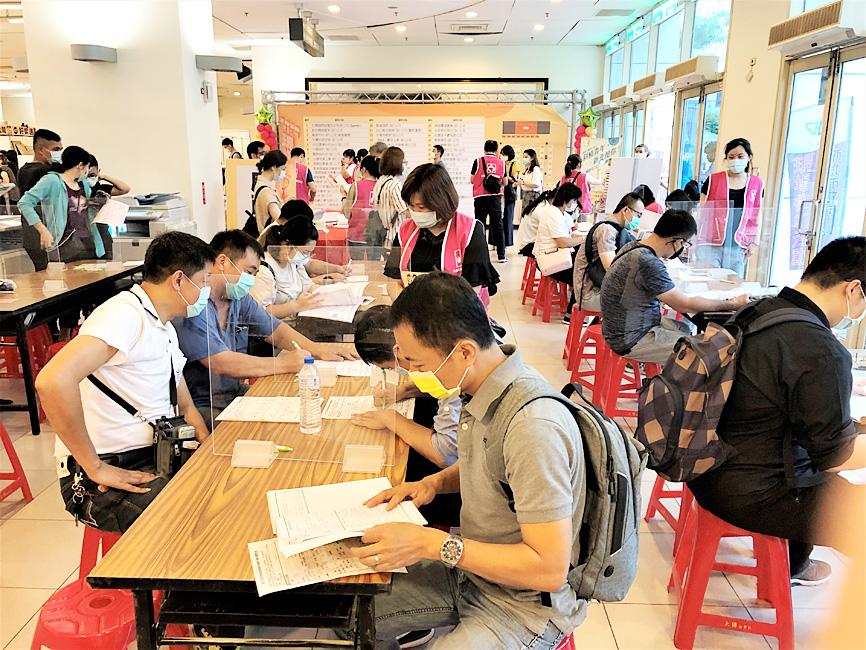The government should offer allowances to recent graduates seeking employment until the nation’s job market improves, the Legislative Yuan’s Judiciary and Organic Laws and Statutes Bureau said in a report on Saturday.
Fewer than one-fifth of recent graduates have landed jobs this year, the bureau said, citing a survey.
The COVID-19 pandemic has dried up the job market in Taiwan as businesses affected by the pandemic have stopped hiring, the report said.

Photo courtesy of New Taipei City Government
Of the 87.3 percent of graduates surveyed who said that they want to work, only 19.6 percent have found jobs, it said.
This means that about 180,000 new graduates are still unemployed, the report said.
“We are seeing graduates who started looking for work at the beginning of the year, and half a year later they still have not found anything. Most graduates can support themselves for an average of two months without work,” the bureau said. “About 39.6 percent of the graduates have no savings.”
Of those seeking employment, 89.8 percent have reported experiencing symptoms of anxiety, a three-year high, it said.
The government’s latest pandemic-relief package offers businesses a subsidy of NT$30,000 for each graduate they hire, but companies do not have any vacant positions, the bureau said.
“The government must not overlook these vulnerable students who are looking for work. Our advice is to give them allowances to help them get through this difficult time,” it said.
The bureau suggested that the government create short-term work opportunities to give graduates temporary employment and help them “gain valuable work experience to make them better prepared for entering the workforce.”
“At the same time, increased subsidies could be offered to academic institutions and civic groups to offer online courses that teach job-hunting skills and strengthen graduates’ multidisciplinary knowledge to make them more competitive,” the report said.
Schools should also offer counseling to help graduates cope with the emotional stress of prolonged unemployment, it said.

Eight restaurants in Taiwan yesterday secured a one-star rating from the Michelin Guide Taiwan for the first time, while three one-star restaurants from last year’s edition were promoted to two stars. Forty-three restaurants were awarded one star this year, including 34 in Taipei, five in Taichung and four in Kaohsiung. Hosu (好嶼), Chuan Ya (川雅), Sushi Kajin (鮨嘉仁), aMaze (心宴), La Vie by Thomas Buhner, Yuan Yi (元一) and Frassi in Taipei and Front House (方蒔) in Kaohsiung received a one-star rating for the first time. Hosu is known for innovative Taiwanese dishes, while Chuan Ya serves Sichuan cuisine and aMaze specializes

Taitung County is to launch charter flights to Malaysia at the end of this year, after setting up flights to Vietnam and Thailand, the Taitung County Government said yesterday. The new charter flight services, provided by low-cost carrier Batik Air Malaysia, would be part of five-day tour packages for visits to Taitung County or Malaysia. The Batik Air charter flight, with about 200 seats, would take Malaysian tourists to Taitung on Dec. 30 and then at 12:35pm return to Kuala Lumpur with Taiwanese tourists. Another charter flight would bring the Taiwanese home on Jan. 3 next year, arriving at 5:30pm, before taking the

Taiwan High Speed Rail Corp. (THSRC) plans to ease strained capacity during peak hours by introducing new fare rules restricting passengers traveling without reserved seats in 2026, company Chairman Shih Che (史哲) said Wednesday. THSRC needs to tackle its capacity issue because there have been several occasions where passengers holding tickets with reserved seats did not make it onto their train in stations packed with individuals traveling without a reserved seat, Shih told reporters in a joint interview in Taipei. Non-reserved seats allow travelers maximum flexibility, but it has led to issues relating to quality of service and safety concerns, especially during

STATS: Taiwan’s average life expectancy of 80.77 years was lower than that of Japan, Singapore and South Korea, but higher than in China, Malaysia and Indonesia Taiwan’s average life expectancy last year increased to 80.77 years, but was still not back to its pre-COVID-19 pandemic peak of 81.32 years in 2020, the Ministry of the Interior said yesterday. The average life expectancy last year increased the 0.54 years from 2023, the ministry said in a statement. For men and women, the average life expectancy last year was 77.42 years and 84.30 years respectively, up 0.48 years and 0.56 years from the previous year. Taiwan’s average life expectancy peaked at 81.32 years in 2020, as the nation was relatively unaffected by the pandemic that year. The metric